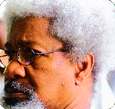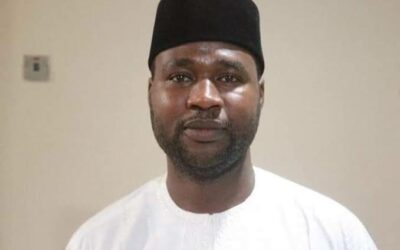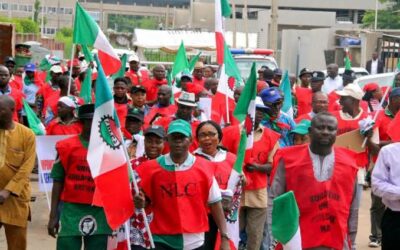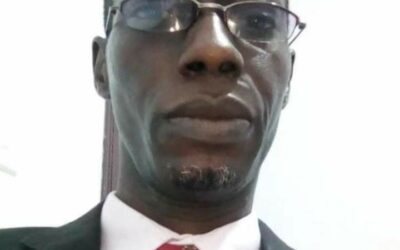That brings us to ‘state’. There is the state of Texas , and there is also Cross-River state. Kindly conceive these as states as being spoken of with a small ‘s’. When I refer to the ‘State’ as the more powerful but thoroughly parasitic, non-productive organism that lords it over nation and community, it would be helpful to conceive of this as ‘State’ with a Capital ‘s’, or else written in italics. The state, despite its impact on civil life, and its agencies – despite its military, police and even the legislature – exists in virtual reality, unlike community or nation which are palpable entities, and are the productive units of human organization. That theme will of course preoccupy our discourse, so, let us plunge headlong into the turbulent waters of nation being.
It is not so long since a group of individuals, exercised by a number of unresolved questions of Nigeria ’s existence, announced their intention to meet and deliberate on this very problematique and present their findings to the people. Not everyone came into this exercise with the same motivations, obviously, but all were concerned by the fact that the occupants of this nation space had never really met, in full freedom, to decide how to pursue the nation project, which obviously involves a formulation of the protocols of co-existence. They were motivated by the fact that, right from the convocations of the first-generation independence leaders in the Lancaster House encounters, to the last secretive exercise that resulted in what passes for today’s Nigerian constitution, the truth is that the communities, the primary components of this nation space have never met, in total freedom, to decide those fundamental protocols. Each set of agreements has been mid-wived by supervening powers – the colonial, then the military, a cabalistic class that has proved every bit as alienated from the people upon whom they forced their rule, as were the master races of the Berlin conference.
Need I remind you of the response from the state? Peals of thunder rumbled out from Aso Rock, threatening incinerating lightning to follow, of which the only decipherable word was an absurdity that deserved to go into all record books: Treason! Was that surprising? It is the nature of the State, especially in its alienated condition, to find all actions on behalf of nation a treasonable act towards itself. The Inspector-General of Police, acting on orders, got into the act, warned that any such gathering, that is, any attempt by a free people to gather and discuss the protocols that would either turn them into, or confirm them as a nation, would be met with a violent response. Those who were involved in that effort, PRONACO, will recall that I was, until that point, no more than a moral, nomimal member of PRONACO. The united opposition to the Sanni Abacha dictatorship had already done its bit under the Abdusalami regime, commencing the process for re-constructing the post-Abacha nation on a more durable foundation – on the basic unit of communities. We convened a pre-PRONACO conference in Lagos – with the Abdusallami regime in two minds about whether or not to proscribe the event. In the end, wiser counsel prevailed and that encounter held – in Agege . Come PRONACO, I had not the time, energy, or inclination to expend on a more demanding exercise. My contribution was to have been nothing more than forwarding the findings of the pilot 1998 conference to PRONACO, assuring them of continued support. However, when matters took that menacing turn, a challenge by the State to the fundamental and democratic authority of the communal polity, it was clear that we all had to be physically present at the formative meeting, and so we were – Chief Anthony Enahoro, Beko Ransome-Kuti, Jadesola Akande, Dr. Fasehun, Asari Dokubo, Ahmed Yerimah and all, representatives from the length and breadth of the nation. The media, local and international were there in full force to witness the confrontation. In the end, the state decided to recognize its limitations, and let the nation pursue its mission.
Many have wondered what was the point of the PRONACO exercise, and some have declared it an exercise in futility. Several answers to that, but just one or two within the context of our theme, to remind ourselves that the nation question goes beyond its very existence but critically implicates the question: what nature of nation? Such voices failed to appreciate the necessity to contest every inch of ground between the state and the nation, using whatever weaponry is available and practicable. The right of free assemblage is only one of such grounds – an unconditional right – that must be tested and contested wherever it is threatened.
Let me recall to your minds the despicable police assault on women on a peaceful solidarity march with the bereaved mothers of schoolchildren, those who had lost their lives in the plane inferno on the Port Harcourt airstrip, a catastrophe whose responsibility, among others rested squarely at the feet of the state for its neglect, its failure at regulating the safety procedures of airline companies or maintain air-strips. These obscenities, even without the arrogant emasculation of that other arm of state – the judiciary – pointed to a project that had resolved to contract even the state to a personal, sole, occupancy, and the inexorable motion towards a police state. It is only alertness to the fundamental entitlements of nation and community, backed by a combination of appropriate initiatives, that can stem the tide of state dictatorship.
Why does one find it necessary to evoke these details? Because we need to remind ourselves, again and again, that the state is not the nation. That the state is historically opposed to nation-becoming, even while spouting nationalist fervour. It will always act in its own interests, not in the interest of the nation entity. A nation space may qualify for a police state, including, increasingly, the theocratic kind, but it still is not a nation., least of all when temporarily appropriated by an individual whose credo of existence is – L’etat, c’est moi.
Another reminder to the negativists is that the aspiring nation has to learn to be pro-active, to anticipate what measures the state might embark upon as deflective measures from the increased self-awareness, legitimate interests and entitlements of the nation. Out of the exercise of PRONACO emerged, not only a document, but a methodology, providing a model for future deliberations of this nature. Not for a moment did PRONACO claim that it had set out to pronounce the last word. On the contrary, it constantly stressed that its goal was to craft a draft document to be presented to the nation, a document whose very existence would challenge the imposition of false documentations of nation desire, and would, by contrast, provide an accurate mirror of the public will.
The methodology – please pay close attention to this – the methodology offers a viable model of societal advance towards nation formation, involving, as it did, the itemization and representation of an unprecedented number of ethnic nationalities within the Nation, one that provided one of the two principal vectors in the national grid-work, on which representation was based. The other vector was Civil Society organizations. I cannot stress this composition too strongly – the meticulous commitment to community representation – so let no one imagine, through ignorance, or lack of imagination, that all possibilities of the democratic process have been exhausted. It remains an instructive proceeding in the fashioning of democratic strategies for inclusivity. Considering that this was a voluntary, permanently cash-strapped exercise, involving personal sacrifices high and low, this, let it be admitted, constituted a first in the numerous efforts at self-determination within this nation space and beyond.
Need I add that the organic integrity of this process spurred the state into emulative efforts – one, clearly dishonest and opportunistic, the other – well, we await the results. The first was the charade mounted by the then arrow-head of state who quickly convened something it named Constitutional Reforms. If only even that reductive effort to undermine the mobilizing potential of the PRONACO undertaking were sincere! It was not, however, as the entire nation quickly came to recognize. That incumbent arrow-head merely saw an opportunity to prolong his long-nurtured – as revelations have affirmed – long harboured plot against the nation – yes, it was on that head that the real charge of treason should be laid, that waste of a nation’s resources to subvert the constitution even as it stood, Does anyone really need to be told that, had that ploy succeeded, it would have installed that aspirant as a Life incumbent of the presidential throne. This nation had a narrow escape, and the principled opponents deserve to be nationally honoured. But for them, most especially those hard-core refusenik legislators, we would today have been plunged into a Zimbabwean scenario, where a power-drunk individual has successfully subsumed firstly the nation of Zimbabwe under the state, then the state under his own nationally repudiated persona.
Yes, indeed Zimbabwe, the nation where in the midst of hunger, poverty, and an epidemic that has consumed hundreds of children, an octogenarian squanders millions on the celebration of his 85th birthday. The expenditure, state megaphones respond to the rage of critics , was made up of voluntary contributions by adoring citizens, those very citizens who had been bulldozed from their squalid homes, and even the affluent who had been silenced and sidelined from the task of nation-building. We know all about that kind of voluntary contribution. The monument to that miracle of voluntarism rides high in my home town, Abeokuta, a moral eyesore that will go down in history as the first – and hopefully only – Presidential Laundromat, since that was where the national summitry of money-laundering and extortionist chicanery was monumentalized. So we know just how far the culture of ‘voluntary contributions’ can go, to what depths of depravity it can sink. The last word has not been spoken, I assure you, about that insult to the intelligence of this nation, never mind how many institutional figureheads are bribed or hoodwinked into lending it legitimacy,




